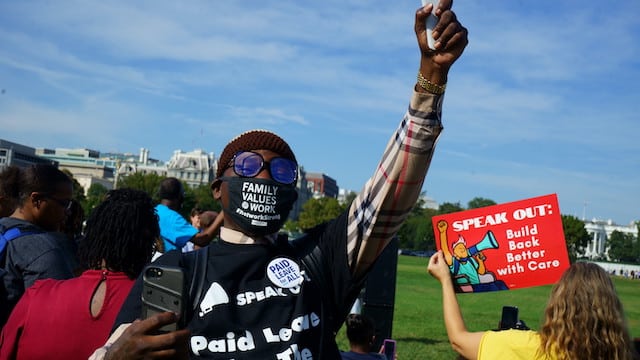New Research Shows Need for More Outreach on Paid Family Leave

By Vibhuti Mehra, Labor Project for Working Families
 Lisa Mukai, a mother of two from Redwood City, has good reason to appreciate California’s Paid Family Leave (PFL) program – a family leave insurance program that provides income replacement to workers taking time off to care for a new child or a seriously ill family member. Lisa used the program twice – when she took leave to care for her mother who was suffering from a brain tumor and Parkinson’s disease and after the birth of her second child. “The Paid Family Leave program allowed me to support my family when they needed me the most without having to worry about how I would financially survive while I was taking care of them,” says Lisa,
Lisa Mukai, a mother of two from Redwood City, has good reason to appreciate California’s Paid Family Leave (PFL) program – a family leave insurance program that provides income replacement to workers taking time off to care for a new child or a seriously ill family member. Lisa used the program twice – when she took leave to care for her mother who was suffering from a brain tumor and Parkinson’s disease and after the birth of her second child. “The Paid Family Leave program allowed me to support my family when they needed me the most without having to worry about how I would financially survive while I was taking care of them,” says Lisa,
who was working as a hairstylist when she took the leave.
Personal testimonials as well as research confirm the many benefits of the PFL program. However, as the 10 year anniversary of the groundbreaking Paid Family Leave Act approaches, many Californians still remain unaware of their right to use the program – even when they need it the most. Results of a new field poll by researchers from the Center for Economic and Policy Research (CEPR) and City University of New York (CUNY) show that awareness of the PFL program remains limited, especially among those who would benefit from it most.
The field poll, conducted by Senior Economist Dr. Eileen Appelbaum and Professor of Sociology Dr. Ruth Milkman, found that well under half (42.7%) of respondents had “seen, read or heard” of the PFL program. Awareness varied by ethnicity, with Black and Latino respondents being least likely to be aware of the law, and was substantially lower among groups with lower income levels, less education and renters. The authors collected data from registered voters in six counties in California.
In 2002, California became the first state in the nation to pass the Paid Family Leave Act. The PFL program was implemented in 2004, making it possible for more than 13 million Californians to receive up to 55 percent of their wages for six weeks while they provide care for a family member with a serious health condition or to bond with a new child. Employees directly fund the program through paycheck contributions to the California State Disability Insurance (SDI) fund.
The new survey builds on Appelbaum and Milkman’s comprehensive study of the PFL program released in January 2011 that found that the program received high marks from employers and employees alike since its implementation six years ago, that initial business concerns over the costs or potential abuse of the program were unfounded, and that the economic, social and health benefits of paid family leave have been extensive.
“This survey shows that we still have work to do to ensure that all Californians are able to take leave when their families need them,” says report author Ruth Milkman, Professor of Sociology at the CUNY Graduate Center and Academic Director of CUNY’s Murphy Labor Institute. “With Black and Latino workers the least aware of their right to take paid family leave, we must do more to educate communities of color.”
While awareness of the PFL program remains limited, it has grown slowly over time, according to a systematic comparison to results of Appelbaum and Milkman’s 2003 survey. Over the past eight years, awareness has increased by about 50%, and has grown even more among female voters.
“Education and outreach on the paid family leave law to disadvantaged groups, including those with lower household incomes and limited education, is critical to California families and communities,” says report author Eileen Appelbaum, Senior Economist at CEPR.
Appelbaum and Milkman’s poll follows the release new national data from the Census Bureau, which found that only 50.8 percent of first-time mothers are able to use some kind of paid leave, leaving lower-educated mothers four times more likely to be without access to paid leave benefits by their employer.
The California Work & Family Coalition and Labor Project for Working Families are
committed to increasing awareness about the PFL program through education and
outreach to California’s working families, especially those who cannot afford
to lose even a day’s pay. Help us spread the word about this important program.
To learn more, visit www.paidfamilyleave.org or contact the Employment Development Department at (877) 238-4373.
Vibhuti Mehra is the Communications & Development Director at the Labor Project for Working Families.